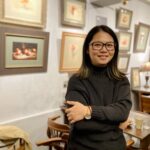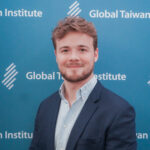Wednesday, August 13, 2025 from 12:00PM – 1:15 PM (ET)
In-person and Webcast
Event Summary:
On August 13, 2025, the Global Taiwan Institute (GTI) hosted a public seminar entitled “Taiwan’s Unofficial Diplomacy in Asia.” The discussion featured three panelists: Leah Lin, the founder and executive director of the Taiwan-based NGO Asia Citizen Future Association (ACFA, 亞洲公民未來協會); Zoë Weaver-Lee, an adjunct fellow at GTI and an incoming graduate student at National Chengchi University; and Jeffery Shih-Chieh Wang, a PhD candidate at Indiana University Bloomington. GTI Research Fellow Benjamin Sando moderated the event.
Leah Lin began her presentation by providing an overview of the status of civil society across Southeast Asia and the increased number of legal tactics deployed by governments to shrink civic space. While civil society groups and human rights defenders in Southeast Asia may express interest in seeking refuge or expanding their operations to Taiwan, Taiwan is not equipped with the legal frameworks to protect foreign civil society and human rights actors. Taiwan also lacks general knowledge about Southeast Asia and experience working with Southeast Asian partners. Additionally, official policies such as the New Southbound policy (NSP, 新南向政策), while in place, have done an inadequate job of promoting human rights and supporting civil society. To rectify this, Lin suggests that Taiwanese partners should play a larger role in facilitating grassroots networks between community organizations and activists in Taiwan and Southeast Asia; in the long-run, such networks will also allow civil society to freely pursue goals distinct from those of national policies. Such considerations also thread through ACFA’s research, which, conducted in collaboration with civil society organizations in Southeast Asia, investigates threats to the freedom of association in Southeast Asia, interest among NGOs in Southeast Asia in going to Taiwan, and Taiwan’s readiness to address narrowing civic space in Southeast Asia.
Lin then assessed Taiwan’s potential as a regional hub for civil society organizations. Factors working in its favor include a fair political climate, geographic proximity to Southeast Asia, experience with navigating PRC influence on its governance, and a less restricted civic space. However, obstacles from hard-to-obtain visas, strict barriers of entry facing prospective associations, the endurance of the Civil Associations Act (人民團體法) enacted in 1942 during ROC rule on the mainland), and limitations to foreigners’ rights to associate in Taiwan make Taiwan a challenging place to set up shop. To overcome these challenges, ACFA has built cross-regional platforms intended as spaces for dialogue with Southeast Asian partners; advocated to governments based on its research findings; arranged opportunities for interaction between Southeast Asian groups and Taiwan’s government; and raised awareness within Taiwanese civil society and government.
ACFA was not founded with the explicit aim to increase Taiwan’s visibility. Rather, it was founded to encourage Taiwan to show up for its Southeast Asian partners and ask: “what is in your interest?” Already, there are signs that relations between civil society in Southeast Asia and Taiwan are strengthening. Following the failure of the recall votes, ACFA invited Kunthida Rungruengkiat, former Thai parliamentarian and Future Forward Party Deputy Leader, to share a conversation about moments of seeming failure for democracy and democratic change. Nevertheless, dialogue needs to occur more frequently and all relationships require further cultivation.
Following Lin’s primer, Zoë Weaver-Lee spoke about Taiwan’s official development assistance (ODA) policy, its potential diplomatic impact, and challenges confronting Taiwan as an aid donor. TaiwanICDF (國際合作發展基金會), chaired by Taiwan’s Minister of Foreign Affairs, is the official channel through which Taiwan manages its USD 468 million in programs for aid and administers its foreign assistance projects spanning 45 countries. In Taiwan’s case, especially, framing—both by Taiwan and external actors—matters greatly to the reception of its aid programs and their utility as diplomatic tools. After assuming office, former President Tsai Ing-wen (蔡英文) sought to restore trust in Taiwan’s ODA institutions by distancing them from past incidents of checkbook diplomacy. Apart from managing its reputation, how Taiwan markets itself as an aid partner and how others view it as a partner in aid also offer insights into the potential of ODA as a diplomatic tool. Although Taiwan rarely tracks and advertises its aid efforts, local media in aid-receiving societies and international media portray Taiwan’s ODA in generally positive terms, with the former highlighting Taiwan as a “partner in development,” a model, and people-centered in its approach to aid. Meanwhile, the latter tends to accentuate the positive implications of Taiwan’s ODA on attracting future investment to receiving nations.
Foreign aid shapes public opinion, but the influence of public opinion over policy remains varied. Additionally, though Taiwan’s public image is improving, Weaver-Lee warned that it is always in flux. When fixated on the numbers, the human impact of Taiwan’s aid projects—one of Taiwan’s greatest areas of advantage—is overshadowed. Still, Taiwan should continue implementing smaller-scale, human-centered aid projects, even as demands for increased financial contributions and project size intensify.
The panel’s last speaker, Jeffery Shih-Chieh Wang gave an overview of his PhD research on Taiwan’s unofficial diplomacy in the Asia-Pacific Economic Cooperation (APEC). Drawing upon his working experience in APEC, the presentation centered on four main topics: why Taiwan’s inclusion in APEC is important; how project co-sponsorship acts as a mechanism to build unofficial alliances; modeling strategic participation through a network perspective; and a summary of main takeaways. First, Wang briefed the audience on what APEC is and why it matters for Taiwan. With 21 members from the Pacific and Asia—including world powers such as the United States, China, and Russia—APEC makes up 61 percent of the global GDP and nearly half of the share of world trade. In September 1991, Taiwan joined APEC alongside the PRC and Hong Kong, making APEC one of the few formal IGOs in which Taiwan can enjoy full membership. However, Taiwan’s APEC participation is constrained by certain factors, such as ministerial representation limits and restrictions on hosting upper-level meetings. Second, Wang explained project co-sponsorship, a rarely discussed APEC mechanism, and how it is useful for building Taiwan’s unofficial alliances. For instance, one of Taiwan’s most important efforts in APEC was spearheading the APEC Digital Opportunity Center (ADOC) Project, a rare 10-year initiative to reduce digital divides in the Asia-Pacific region, which utilized a two-way approach that was both “top-down” and “bottom-up.” Overall, Taiwan’s membership in APEC can be summarized in three rules of thumb: actively participating in APEC projects where Taiwan can contribute best practices, similar to Weaver-Lee’s ODA policy discussion or Lin’s civil society efforts; collaborating with influential member economies; and taking institutional roles such as working group chairs.
Wang’s research answers the central question of how we can measure the effectiveness of Taiwan’s strategies in APEC. The presentation’s third element thus focused on conducting network analysis to understand Taiwan’s strategic alignments and participation. APEC co-sponsorship can be modeled as a directional network from which co-sponsoring members and Taiwan’s position in an overall network structure can be thoroughly examined. Resulting analysis found that APEC generally follows a strategic bandwagoning pattern, in which dominant actors create asymmetrical power relationships to gain benefits and security. In conclusion, several key takeaways from Wang’s research can improve Taiwan’s future APEC participation: APEC’s environment features strong friend-of-friend clustering and hierarchical or one-sided cooperation structures rather than mutual exchange; issue salience shapes alignment strategies between high-politics areas, such as trade or energy, and low-politics areas; and evidence reveals pragmatic rather than value-based cooperation. In terms of implications for Taiwan, these results suggest that Taiwan can boost its influence by proposing projects that can be connected by “popular” APEC members—such as Japan, Australia, or the United States—in order to increase its likelihood of receiving co-sponsorship.
Event Description:
The Global Taiwan Institute (GTI) is pleased to invite you to a panel discussion titled “Taiwan’s Unofficial Diplomacy in Asia.”
Taiwan has no formal diplomatic allies on the Asian continent. But how does Taipei—in spite of diplomatic isolation and heavy coercive pressure from Beijing—build productive relationships with Asian partners? Taiwan has long relied on creative approaches to overcome its diplomatic isolation: such as civil society diplomacy, foreign aid programs, and engagement with the limited number of multilateral organizations where international recognition is not a prerequisite. But can this make up for Taiwan’s gradually declining official diplomatic recognition?
In this GTI seminar, Leah Lin—Secretary-General of the Asia Citizens Future Association (ACFA)—will lay out how ACFA promotes democracy by building civil society relationships between Taiwan and Southeast Asia. Zoë Weaver-Lee, adjunct fellow at the Global Taiwan Institute, will discuss how Taiwan has employed foreign aid programs to form societal connections in Asia even without diplomatic recognition. Finally, Jeffery Wang, PhD candidate at the University of Indiana-Bloomington, will share his research into Taiwan’s effective use of the Asia Pacific Economic Cooperation (APEC) grouping to bolster its economic diplomacy, despite Beijing’s pressure. The event will be moderated by GTI Research Fellow Benjamin Sando.
The event will be held at GTI’s office located at 1836 Jefferson Place NW in Washington DC (approximately one block from the Dupont Circle Metro). Doors will open at 11:30 AM, and the event will begin at 12:00 PM. A light lunch will be provided. Please direct questions or concerns to Senior Programs Manager Adrienne Wu at awu@globaltaiwan.org.
**Media: Please contact Yuchen Lee at ylee@globaltaiwan.org if you would like to bring additional crew members or equipment, so that we can be sure to accommodate you.
The Panelists:
Leah Lin is the Founder and Executive Director of Asia Citizen Future Association (ACFA), a Taiwan-based NGO committed to defending civic space in Taiwan and Southeast Asia through close collaboration with local civil society organizations. As an experienced human rights practitioner, Leah specializes in supporting human rights defenders at risk and building resilient cross-border networks. Her work focuses on developing sustainable, secure, and strategic infrastructures to strengthen civic movements across the region. Leah’s efforts position Taiwan as a critical and transformative base for transnational civil society engagement in East and Southeast Asia. She has actively advocated for policy and legal reforms to address institutional barriers in Taiwan, including restrictions on foreign NGO registration. In parallel, she works with partners in four Southeast Asian countries to promote legal protections for the freedom of association. Through her leadership, Leah seeks to establish Taiwan as an emerging regional hub for civil society incubation, transnational solidarity, and democratic resilience.
Zoë Weaver-Lee is an incoming graduate student at National Chengchi University in Taipei, Taiwan under the Ministry of Education Taiwan Scholarship, as well as an adjunct fellow at GTI. Previously, she served as a programs coordinator at the East-West Center in Washington and as a program associate at the Global Taiwan Institute, where she focused on Taiwan’s foreign assistance policy and China’s use of economic coercion. She graduated from Stetson University in 2019 with a Bachelor’s Degree in Global Development and minors in Political Science and Asian Studies. Zoë has participated in programs such as the Huayu Enrichment Scholarship and the Taiwan-US Policy Program, and has presented her research at the North American Taiwan Studies Association conference. She will also be co-authoring a book chapter on Taiwan’s aid programs under President Tsai Ing-wen to be published in 2025.
Jeffery Shih-Chieh Wang is a PhD candidate in Political Science and Informatics at Indiana University Bloomington. His research examines how non-binding international organizations, such as APEC and ISO, facilitate strategic alignments through cooperation networks, with a focus on Taiwan and China. From 2013 to 2016, he served as the APEC SME Working Group focal point on behalf of Taiwan’s Small and Medium Enterprise Administration, hosting APEC meetings in Taiwan, attending APEC ministerial meetings, contributing to joint-ministerial declarations, and drafting APEC-funded projects that were successfully approved and implemented.
The Moderator:
Benjamin Sando is a research fellow at the Global Taiwan Institute, where he investigates PRC united front influence operations and hosts the Global Taiwan Insights podcast. He previously worked at the Doublethink Lab NGO in Taipei, Taiwan, studying PRC united front strategy for the China Index project. Sando holds an MA in Asian Studies from the Georgetown University School of Foreign Service. He completed his BA at Stanford University, where he majored in International Relations and minored in Mechanical Engineering. Sando has lived in Seoul, South Korea, as a researcher at the ROK National Assembly Research Service and the Yonsei University Institute for Sinology. Fluent in Mandarin and Korean, his writing has been published by the Global Taiwan Brief, Council on Foreign Relations, East Asia Forum, The Diplomat, NK News, and others




